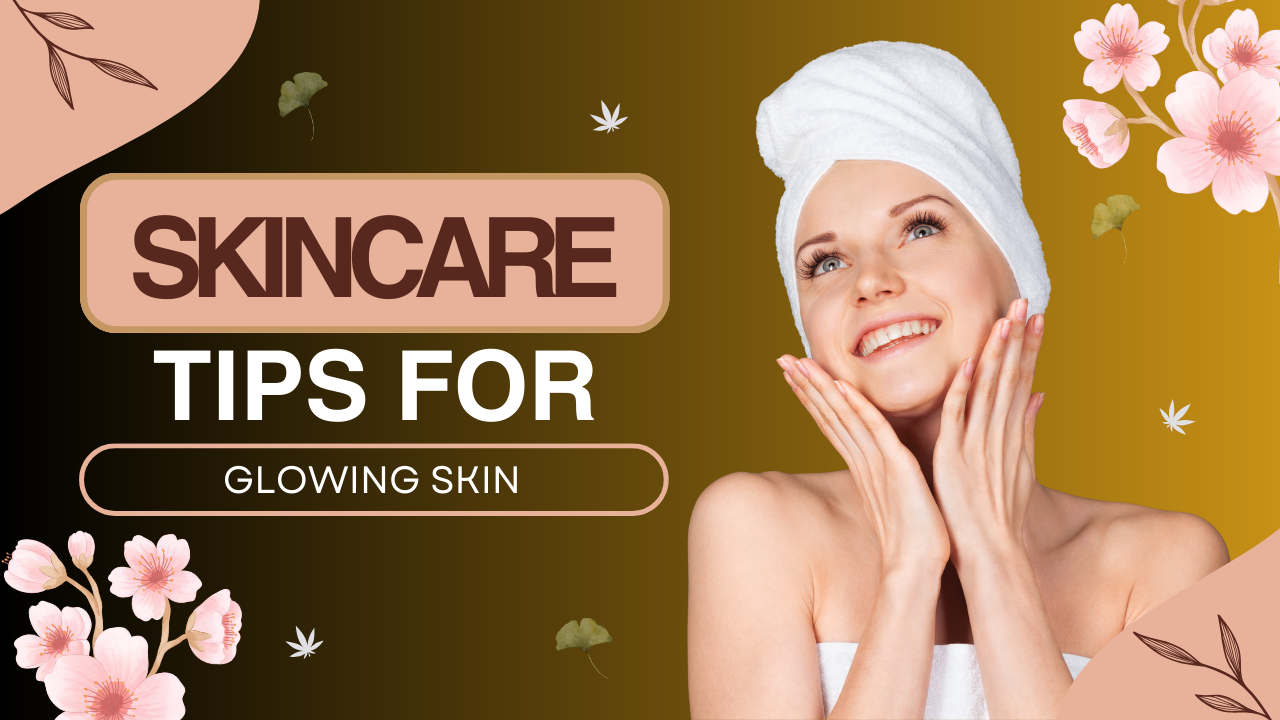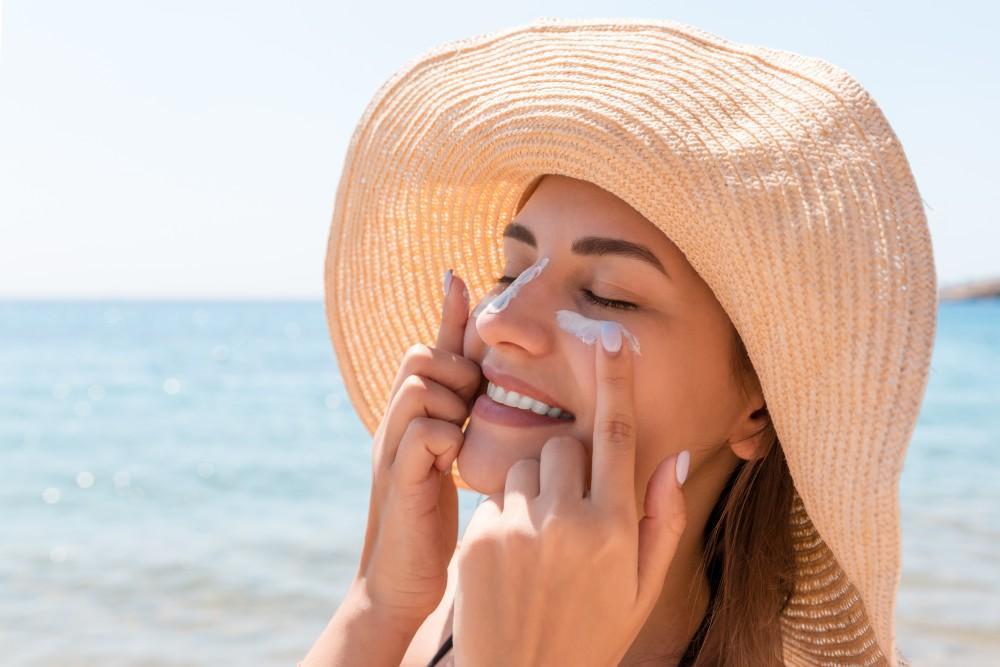Skincare Tips for Glowing Skin
Glowing skin comes from consistent care, not quick fixes. Dermatologists emphasize hydration, sun protection, cleansing, sleep, and nutrition as the foundation of healthy skin. The following skincare tips for glowing skin are backed by clinical studies, professional guidelines, and proven routines.
1. Ensure Hydration for Healthy Skin
Ensure hydration supports elasticity and brightness. According to the National Academies of Sciences, women need about 2.7 liters of fluids daily, while men need about 3.7 liters. Hydration helps the skin barrier function and keeps dryness away.
Ensure topical hydration with hyaluronic acid serums, glycerin moisturizers, and ceramide creams. The American Academy of Dermatology (AAD) recommends applying moisturizer right after cleansing to trap water in the skin.
2. Apply Sunscreen Every Day
Apply sunscreen shields the skin from premature aging and dark spots. The World Health Organization (WHO) reports that up to 80% of visible aging is caused by UV exposure. Broad-spectrum sunscreen with SPF 30 or higher blocks both UVA and UVB rays.
Apply sunscreen that contains zinc oxide, titanium dioxide, or avobenzone for full coverage. The Skin Cancer Foundation confirms that daily sunscreen use lowers the risk of melanoma and other skin cancers. Reapply every two hours when outdoors.
3. Follow a Consistent Skincare Routine
Follow a consistent skincare routine to achieve lasting results. Dermatologists recommend the CTM method: cleanse, tone, and moisturize.
Morning routines should include a cleanser, Vitamin C serum, moisturizer, and sunscreen. Evening routines should include a cleanser, retinoid, and nourishing moisturizer. Results appear after 6–8 weeks of consistent practice.
4. Exfoliate to Remove Dead Skin Cells
Exfoliate skin to speed up cell turnover and improve texture. The Journal of Dermatological Science confirms that exfoliation enhances epidermal renewal.
Exfoliate with chemical options like alpha hydroxy acids (glycolic acid) or beta hydroxy acids (salicylic acid), or use physical scrubs with caution. Sensitive skin responds better to lactic acid or enzyme-based exfoliants. Over-exfoliation can damage the barrier and cause redness.
5. Absorb Nutrients Through a Balanced Diet
Absorb nutrients from whole foods to support skin health. A 2012 study in the American Journal of Clinical Nutrition found that antioxidant-rich diets improve complexion.
Absorb Vitamin C from oranges, strawberries, and bell peppers. Vitamin E from almonds and sunflower seeds helps prevent oxidative damage. Omega-3 fatty acids from salmon, walnuts, and chia seeds strengthen the skin barrier. Zinc from beans and lentils regulates oil production and supports healing.
6. Spend Enough Time Sleeping
Spend at least 7–9 hours sleeping each night for skin repair. The National Sleep Foundation states that restorative sleep helps rebuild collagen and supports skin recovery.
A 2015 study in Clinical and Experimental Dermatology showed that poor sleepers had more wrinkles and slower barrier healing. Use silk pillowcases to reduce friction, and avoid caffeine before bedtime for better rest.
7. Clear Stress for Better Skin
Clear stress to prevent breakouts and dullness. Cortisol, the stress hormone, increases oil production and inflammation. The American Psychological Association confirms that chronic stress delays skin barrier repair.
Clear stress with yoga, meditation, and controlled breathing. A 2016 review in the Journal of Clinical Medicine reported that stress-reduction therapies improve conditions like acne and eczema.
8. Maintain Clean Skin
Maintain cleanliness to reduce clogged pores and irritation. Dermatologists recommend washing the face twice daily with a gentle, pH-balanced cleanser. The AAD warns against bar soaps that strip natural oils.
Always remove makeup before bed. Micellar water, cleansing balms, or oil cleansers are effective. Double cleansing (oil + water-based cleanser) is recommended for heavy makeup users.
9. Choose the Right Products for Your Skin Type
Choose skincare products that match your skin type for best results. The British Journal of Dermatology highlights that using unsuitable products can worsen irritation.
-
Oily skin: foaming cleansers with salicylic acid.
-
Dry skin: cream cleansers and emollient moisturizers.
-
Sensitive skin: fragrance-free and hypoallergenic formulas.
-
Combination skin: lightweight gel moisturizers.
Dermatologists advise patch-testing new products for 48 hours before applying them to the face.
10. Consult Dermatologists for Professional Care
Consult dermatologists when at-home skincare does not deliver results. Professional treatments like chemical peels, microdermabrasion, micro needling, and laser therapy address deeper issues.
Annual skin checks are recommended by the Skin Cancer Foundation to detect early signs of melanoma, especially for people with family history or high sun exposure.
Additional Practices for Glowing Skin
Ensure protection from environmental stressors by avoiding smoke, pollution, and harsh chemicals. Wear hats and sunglasses with UV filters outdoors.
Follow good hygiene practices such as washing pillowcases weekly and cleaning makeup brushes regularly.
Absorb antioxidants from topical serums like Vitamin C, niacinamide, and green tea extract. Research in Dermatologic Therapy confirms that antioxidants reduce oxidative damage.
FAQs
1. How many times should I wash my face?
Wash your face twice daily—morning and night. Wash again after sweating. Avoid over-washing to prevent dryness.
2. What is the best skincare routine for glowing skin?
The best routine is: morning—cleanser, Vitamin C, moisturizer, sunscreen. Evening—cleanser, retinoid, moisturizer.
3. Is sunscreen necessary for glowing skin?
Yes. The WHO states UV radiation causes most premature aging. SPF 30 or higher prevents wrinkles, spots, and dullness.
4. How often should I exfoliate my skin?
Exfoliate 1–3 times weekly. Oily skin benefits from salicylic acid, while dry skin benefits from lactic acid.
5. Does drinking water improve skin glow?
Yes. Proper hydration supports elasticity and barrier repair. The National Academies of Sciences confirms daily intake requirements.
6. What vitamins are good for glowing skin?
Vitamin C, Vitamin E, Vitamin A (retinoids), and Vitamin D all support healthy skin.
7. Can stress affect skin glow?
Yes. Cortisol triggers breakouts and dullness. Stress management lowers inflammation.
8. When should I see a dermatologist?
See a dermatologist if skin problems persist for over 8 weeks or for annual skin cancer screenings.




One thought on “Skincare Tips for Glowing Skin”